- Home
- Arthur Miller
Collected Essays
Collected Essays Read online
COLLECTED ESSAYS
ARTHUR MILLER was not only one of America’s most important playwrights of the twentieth century, but also one of its most influential literary, cultural, and intellectual voices. Throughout his career, he consistently remained one of the country’s leading public intellectuals, advocating tirelessly for social justice, global democracy, and the arts. Theater scholar Susan C. W. Abbotson introduces this volume as a selection of Miller’s finest essays, organized in three thematic parts: essays on the theater, essays on specific plays including Death of a Salesman and The Crucible, and sociopolitical essays on topics spanning the Depression to the twenty-first century. Written with playful wit, clear-eyed intellect, and, above all, human dignity, these essays offer unmatched insight into the work of Arthur Miller and the turbulent times through which he guided his country.
PENGUIN CLASSICS DELUXE EDITION
COLLECTED ESSAYS
ARTHUR MILLER (1915–2005) was born in New York City and studied at the University of Michigan. His plays include All My Sons (1947), Death of a Salesman (1949), The Crucible (1953), A View from the Bridge and A Memory of Two Mondays (1955), After the Fall and Incident at Vichy (1964), The Price (1968), The Creation of the World and Other Business (1972), and The American Clock (1980). His other works include Focus, a novel (1945); The Misfits, a cinema novel (1961); and the texts for In Russia (1969), In the Country (1977), and Chinese Encounters (1979), three books in collaboration with his wife, photographer Inge Morath. His memoirs include Salesman in Beijing (1984) and Timebends, an autobiography (1987). His short fiction includes the collection I Don’t Need You Any More (1967), the novella Homely Girl, A Life (1995), and Presence: Stories (2007). His later work includes the plays The Ride Down Mt. Morgan (1991), The Last Yankee (1993), Broken Glass (1994), Mr. Peters’ Connections (1999), and Resurrection Blues (2006); Echoes Down the Corridor: Collected Essays, 1944–2000; and On Politics and the Art of Acting (2001). Among numerous honors, he received the Pulitzer Prize for Drama and the John F. Kennedy Lifetime Achievement Award.
SUSAN C. W. ABBOTSON came to the United States from Britain in 1990 and started working at Rhode Island College in 1999, where she is now a professor, specializing in modern and contemporary drama. A leading scholar on the work of Arthur Miller, Dr. Abbotson has published three books and many articles on this seminal American writer. She has been president of the Arthur Miller Society, currently serves on its board, manages its website, and provides bibliographic information on Miller for several other databases. She is also the performance editor for The Arthur Miller Journal, was one of a panel of experts to discuss Arthur Miller on NPR’s On Point with Tom Ashbrook shortly after the playwright’s death, and has been invited to talk about Miller on other radio shows as well as at a number of area theaters. Dr. Abbotson has also published pieces on other playwrights, including Tennessee Williams, Sam Shepard, Thornton Wilder, Paula Vogel, Mae West, William Inge, August Wilson, and Eugene O’Neill. Her most recent work is Modern American Drama: Playwriting in the 1950s.
BY ARTHUR MILLER
PLAYS
The Golden Years
The Man Who Had All the Luck
All My Sons
Death of a Salesman
An Enemy of the People
The Crucible
A View from the Bridge
After the Fall
Incident at Vichy
The Price
The Creation of the World and Other Business
The Archbishop’s Ceiling
The American Clock
Playing for Time
The Ride Down Mt. Morgan
Broken Glass
Mr. Peters’ Connections
Resurrection Blues
Finishing the Picture
ONE-ACT PLAYS
A View from the Bridge (one-act version)
A Memory of Two Mondays
Fame
The Reason Why
Elegy for a Lady (in Two-Way Mirror)
Some Kind of Love Story (in Two-Way Mirror)
I Can’t Remember Anything (in Danger: Memory!)
Clara (in Danger: Memory!)
The Last Yankee
SCREENPLAYS
The Misfits
Playing for Time
Everybody Wins
The Crucible
MUSICAL
Up from Paradise
AUTOBIOGRAPHY
Timebends: A Life
REPORTAGE
Situation Normal
In Russia (with Inge Morath)
In the Country (with Inge Morath)
Chinese Encounters (with Inge Morath)
Salesman in Beijing
FICTION
Focus (a novel)
Jane’s Blanket (a children’s story)
The Misfits (a cinema novel)
I Don’t Need You Any More (stories)
Homely Girl, a Life (a novella and stories)
Presence: Collected Stories
COLLECTIONS
Arthur Miller’s Collected Plays, Volumes I and II
The Portable Arthur Miller
Arthur Miller: Collected Plays 1944–1961 (Tony Kushner, editor)
Arthur Miller: Collected Plays 1964–1982 (Tony Kushner, editor)
Arthur Miller: Collected Plays 1987–2004 with Stage and Radio Plays of the 1930s and ’40s (Tony Kushner, editor)
The Penguin Arthur Miller
ESSAYS
Collected Essays
The Theater Essays of Arthur Miller (Robert A. Martin, editor)
Echoes Down the Corridor: Collected Essays, 1944–2000 (Steven R. Centola, editor)
On Politics and the Art of Acting
VIKING CRITICAL LIBRARY EDITIONS
Death of a Salesman (Gerald Weales, editor)
The Crucible (Gerald Weales, editor)
PENGUIN BOOKS
An imprint of Penguin Random House LLC
375 Hudson Street
New York, New York 10014
penguin.com
Introduction copyright © 2016 by Susan C. W. Abbotson
Penguin supports copyright. Copyright fuels creativity, encourages diverse voices, promotes free speech, and creates a vibrant culture. Thank you for buying an authorized edition of this book and for complying with copyright laws by not reproducing, scanning, or distributing any part of it in any form without permission. You are supporting writers and allowing Penguin to continue to publish books for every reader.
Here constitutes an extension of this copyright page.
LIBRARY OF CONGRESS CATALOGING-IN-PUBLICATION DATA
Names: Miller, Arthur, 1915–2005, author. | Abbotson, Susan C. W., 1961–writer of introduction.
Title: Collected essays / Arthur Miller ; introduction by Susan C. W. Abbotson.
Description: New York : Penguin Books, 2016. | Includes index.
Identifiers: LCCN 2016029622 (print) | LCCN 2016038652 (ebook) | ISBN 9780143108498 (paperback) | ISBN 9781101992043
Subjects: LCSH: American drama—20th century—History and criticism—Theory, etc. | BISAC: PERFORMING ARTS / Theater / History & Criticism. | LITERARY COLLECTIONS / Essays. | BIOGRAPHY & AUTOBIOGRAPHY / Entertainment & Performing Arts.
Classification: LCC PS3525.I5156 A16 2016 (print) | LCC PS3525.I5156 (ebook) | DDC 814/.52—dc23
LC record available at https://lccn.loc.gov/2016029622
Cover illustrations: Riccardo Vecchio
Cover design: Matt Vee
Version_1
Contents
Abo
ut the Author
By the Author
Title Page
Copyright
Introduction by SUSAN C. W. ABBOTSON
COLLECTED ESSAYS
On the Theater
CONCERNING TRAGEDY
Sorting Things Out: Foreword to The Theater Essays of Arthur Miller (1977)
Tragedy and the Common Man (1949)
The Nature of Tragedy (1949)
GENERAL COMMENTARY
Introduction to the Collected Plays (1957)
On Social Plays (1955)
The Family in Modern Drama (1956)
The Shadows of the Gods (1958)
Ibsen and the Drama of Today (1994)
Tennessee Williams’ Legacy: An Eloquence and Amplitude of Feeling (1984)
The Good Old American Apple Pie (1993)
Notes on Realism (1999)
Subsidized Theatre (1947/2000)
CONCERNING LANGUAGE
About Theater Language: Afterword to The Last Yankee (1994)
On Screenwriting and Language: Introduction to Everybody Wins (1990)
On His Works
THE GOLDEN YEARS AND THE MAN WHO HAD ALL THE LUCK
Introduction to The Golden Years and The Man Who Had All the Luck (1989)
FOCUS
The Face in the Mirror: Anti-Semitism Then and Now (1984)
ALL MY SONS
Belief in America (from Situation Normal . . . ) (1944)
DEATH OF A SALESMAN
Extract from Timebends: A Life (1987)
Preface to Salesman in Beijing (1991)
Salesman at Fifty (1999)
AN ENEMY OF THE PEOPLE
Preface to Adaptation of Ibsen’s An Enemy of the People (1951)
Ibsen’s Warning (1989)
THE CRUCIBLE
Brewed in The Crucible (1958)
Again They Drink from the Cup of Suspicion (1989)
It Could Happen Here—And Did (1967)
The Crucible in History (1999)
A VIEW FROM THE BRIDGE
Introduction to A View from the Bridge (two-act version) (1960)
AFTER THE FALL
Foreword to After the Fall (1964)
INCIDENT AT VICHY
Guilt and Incident at Vichy (1965)
THE PRICE
The Price—The Power of the Past (1999)
THE ARCHBISHOP’S CEILING AND THE AMERICAN CLOCK
Conditions of Freedom: Two Plays of the Seventies (1989)
MR. PETERS’ CONNECTIONS
Preface to Mr. Peters’ Connections (1998)
On Society and Politics
JUVENILE DELINQUENCY
Bridge to a Savage World (1958)
The Bored and the Violent (1962)
THE MCCARTHY ERA
Many Writers: Few Plays (1952)
The Night Ed Murrow Struck Back (1983)
1956 and All This (1956)
CONDITIONS IN AMERICA
Concerning Jews Who Write (1948)
Miracles (1973)
The Battle of Chicago: From the Delegates’ Side (1968)
The Limited Hang-Out: The Dialogues of Richard Nixon as a Drama of the Antihero (1974)
American Playhouse: On Politics and the Art of Acting (2001)
Clinton in Salem (1998)
THE HOLOCAUST
The Nazi Trials and the German Heart (1964)
POLITICS ABROAD
Dinner with the Ambassador (1985)
What’s Wrong with This Picture?: Speculations on a Homemade Greeting Card (1974)
The Measure of the Man (1991)
The Parable of the Stripper (1994)
Uneasy About the Germans: After the Wall (1990)
The Sin of Power (1978)
A Visit with Castro (2004)
Why Israel Must Choose Justice (2003)
SATIRE
A Modest Proposal for the Pacification of the Public Temper (1954)
Get It Right: Private Executions (1992)
Let’s Privatize Congress (1995)
Index
Introduction
For Arthur Miller, theater was ever a serious business, and his essays exhibit the strong social and theatrical commitment and conviction that fed his drama, guided his life, and allowed him to be a perceptive commentator on the twentieth century through which he lived for all but fifteen years, as well as a prescient voice for the century to come. To read his essays is not only to learn more about the plays and the playwright, but to also learn much about the societies in which we live, and the core of human nature itself. As early as 1977, in his introduction to the first ever collection of Miller’s theater essays, Robert A. Martin declared that “Miller’s essays on drama and the theater may well represent the single most important statement of critical principles to appear in England and America by a major playwright since the Prefaces of George Bernard Shaw” (xx).
But Martin was only looking at the first thirty years of Miller’s career, and there would be nearly another thirty during which Miller’s scope and insights would broaden as well as deepen. His essays not only inform us of the values that shaped and inspired his artistic vision, but also present a series of provocative, balanced, and insightful commentaries on the world beyond theater. Miller’s theatrical essays, both those explicating his own dramas, and those on the status and development of theater as a whole throughout the twentieth century and beyond, offer a formidable body of work that could hold its own against that of Aristotle, Gotthold Lessing, Vsevolod Meyerhold, or Bertolt Brecht. However, Miller also wrote beyond the confines of the theatrical scene and offered salient observations on a whole array of sociopolitical issues. We should not forget that when he first enrolled at the University of Michigan it was to study journalism, not playwriting, and that desire to be a commentator on human events never abated.
In 1977, Martin viewed Miller as “a writer of unusual talent and insight,” and wrote of how Miller’s “plays have been responsible in large part for extending the significance of the American theater beyond the horizons of its national origins, and for providing a standard of dramatic achievement for contemporary playwrights everywhere” (xix). Nineteen years later, in 1996, in his introduction to the revised and expanded version of The Theater Essays of Arthur Miller, Steven R. Centola posited that the characters in Miller’s plays seem driven “to construct a society based on humanitarian and democratic principle, creating order out of chaos and giving meaning and dignity to human experience” (xlvii). He rightly concluded that Miller’s essays do very much the same thing. But Miller does this in more than just his theater essays, which the scope of this collection is able to emphasize.
What is unique and special about this volume is its selection and organization. As a man who wrote and published essays for sixty years, Miller inevitably repeated himself on occasion, or tried to urge the same point in different words when his initial warning appeared to go unheard. An illustration of this tendency resides in the similarity of the included essays “Notes on Realism” and “About Theater Language.” While their focus is slightly different, they both urge the reader to reconsider their perception of what is meant by “real” in drama. Previous volumes of his nonfiction writing have tended toward presenting everything he wrote, including selections from longer pieces and transcriptions of interviews. Given that the essay is in itself a distinct art form, this collection has (with two worthwhile exceptions) concentrated on actual essays to help better convey Miller’s mastery of that form. Other volumes have also presented materials in a strict chronological order, or divided them into sections that cover topics within the periods of different plays he produced, with no other organizing feature. But Miller’s work in this field can be divided into three distinct categories that have little to do with chronology, and that is what this volume does. It begins by selecti
ng the most important statements Miller made pertaining to theater technique and the state of the theater as a whole, then follows this with a selection of essays that are key to understanding specific plays he created. The final section presents Miller’s commentary on a variety of important social and political issues. By creating this topic-based organization, the hope is to allow the reader to be able to better focus on the reader’s personal area of concern, and the book’s conciseness can, ironically, better convey the sheer scope of Miller’s interests.
ON THE THEATER
Some of Miller’s most famous essays are those he wrote early in his career concerning his definition of tragedy. As we can see from his comments in a later piece “Sorting Things Out” (1977), he created a furor that he later almost regretted, but only “almost.” In “Tragedy and the Common Man,” printed in the New York Times just two weeks after Death of a Salesman opened on Broadway in 1949, and the follow-up, “The Nature of Tragedy,” printed a month later in the New York Herald Tribune, Miller controversially redefined forever the way American dramatists, in particular, would define the genre. Reinventing traditional Aristotelian definitions of tragedy, which Miller saw as having become misunderstood by a skeptical modern audience with different value systems from the ancient Greeks, Miller insisted that while they should remain complex figures, tragic heroes no longer need be high-born, intelligent, or even likable. For Miller, “In the tragic view the need of man to wholly realize himself is the only fixed star.” Thus, tragedy could be wrought from the travails of any human being who refuses against great odds to give up personal dignity and what they deem as their “rightful position” in society. Such characterizations are sufficient to create catharsis and establish the promise of humankind’s potential that Miller saw as central to tragedy, and to lead the audience to examine, and seek to fix, the social faults that caused the protagonist’s destruction.
However, Miller wished to say more about the modern theater and its techniques than argue the ways in which tragedy might be written; he wished to have a bigger impact, and to show how theater could effectively respond to the deepest needs of any society, and do so in a variety of ways without becoming overtly polemic. In its consideration of the problems faced by mid-twentieth-century American theater, “Introduction to the Collected Plays” is a major work toward that aim. Miller explains his “organic” process of playwriting, the need for playwrights to remain connected to the concerns of their audiences, and his humanistic goals of working toward the improvement of society. While “Introduction to the Collected Plays” is one of the longest modern American essays on theater in general (as well as offering several insights into his writing process for many of Miller’s best-known plays), he wrote several other seminal midcentury pieces that further expanded his attempt to redefine drama for what he saw as a new age of theater.

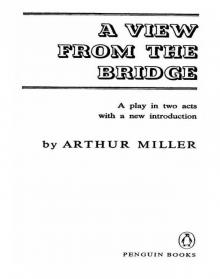 A View From the Bridge: A Play in Two Acts
A View From the Bridge: A Play in Two Acts Broken Glass
Broken Glass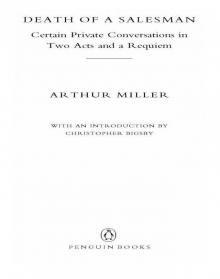 Death of a Salesman
Death of a Salesman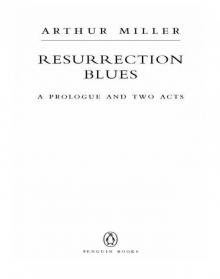 Resurrection Blues
Resurrection Blues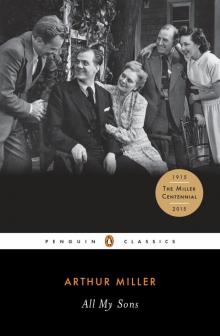 All My Sons
All My Sons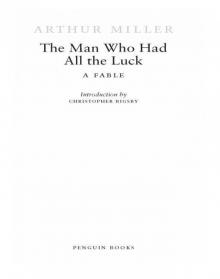 The Man Who Had All the Luck
The Man Who Had All the Luck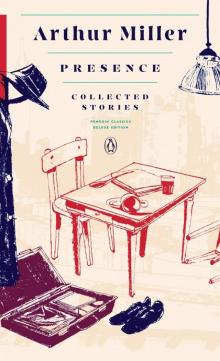 Presence: Stories
Presence: Stories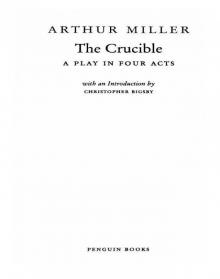 The Crucible
The Crucible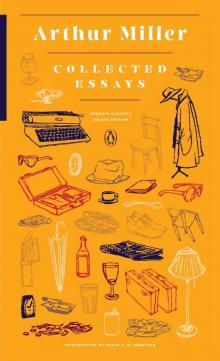 Collected Essays
Collected Essays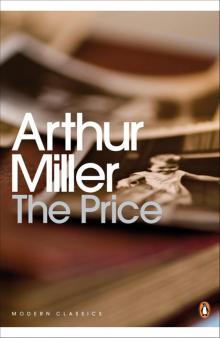 The Price
The Price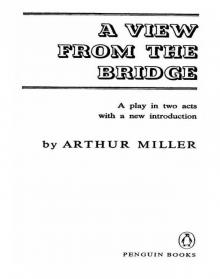 A View from the Bridge
A View from the Bridge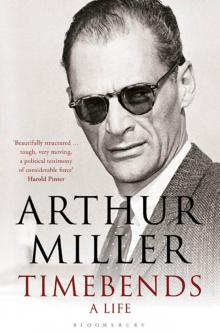 Timebends
Timebends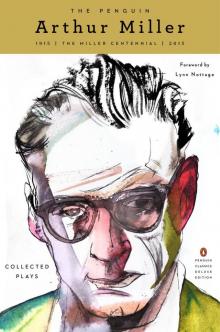 The Penguin Arthur Miller
The Penguin Arthur Miller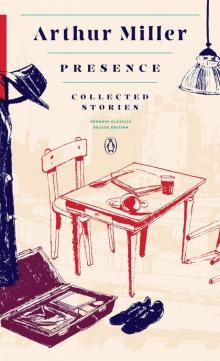 Presence
Presence